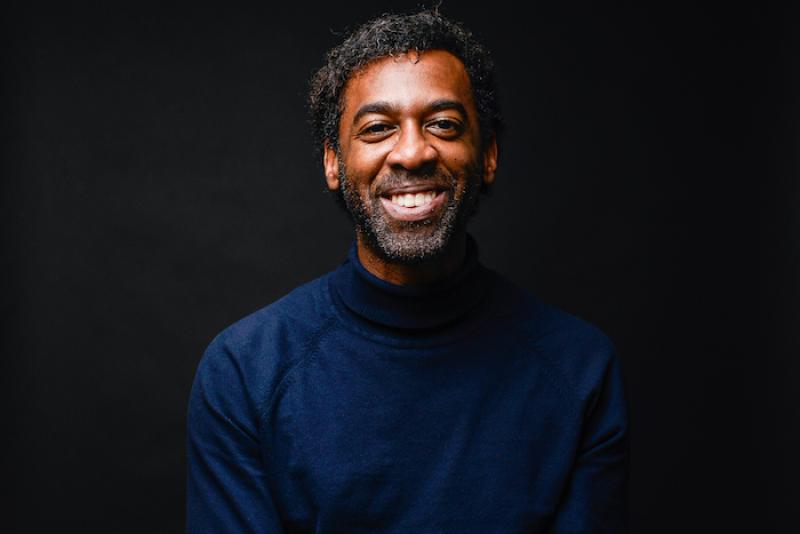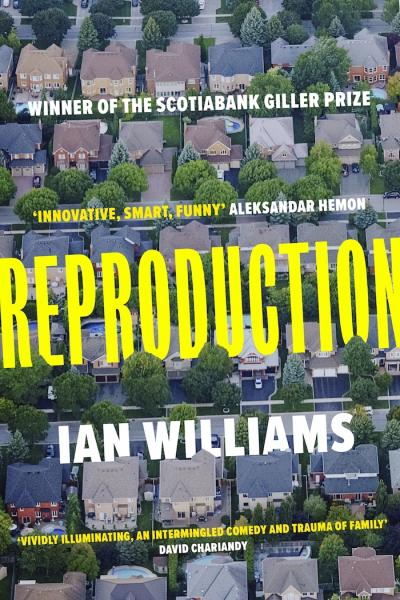Ian Williams: Reproduction review - a dazzling kaleidoscope of life's tragicomedy | reviews, news & interviews
Ian Williams: Reproduction review - a dazzling kaleidoscope of life's tragicomedy
Ian Williams: Reproduction review - a dazzling kaleidoscope of life's tragicomedy
Restless tale of stress and strife is invigorated by endless wordplay and stylistic surprises

Ian Williams’s writing is always in motion. For his 2012 poetry collection Personals, and since, he has composed little circular poems, similar (in style though not sentiment) to the posies you sometimes find inscribed on the inside of rings. He incorporates a couple into Reproduction, his debut and Griffin Prize-winning novel.
This overarching view binds together this lively, restless, four-part novel which, as you might guess from the title, is animated by the cycle of life and death. It feels like a danse macabre at times: the music it moves to is the squabbling, quarrelling and bickering that characterise at least a portion of close-quartered family life. As well as being reminiscent of the pop song lyrics that litter this story (“baby don’t hurt me”), Williams' posies speak to the circling of these arguments with loved ones: nagging refrains and stalemates no one is willing to acknowledge or break.
 That deadlock is where we quickly find our characters at the beginning of Reproduction. Felicia Shaw, a high school student speaking the dialect of her “small unrecognised island” in the Caribbean, is pitched against Edgar Gross, a middle-aged businessman with the overly precise English of a German expat. The strangers strike up a conversation while tending to their mothers, both in palliative care in a Toronto hospital in the seventies. As he does throughout, Williams forgoes quotation marks, giving us free access to a constant undercurrent of thought as their at first tentative then overfamiliar conversation unfolds in half-page episodes, which are as awkward and cramped as the tight space they are forced to share:
That deadlock is where we quickly find our characters at the beginning of Reproduction. Felicia Shaw, a high school student speaking the dialect of her “small unrecognised island” in the Caribbean, is pitched against Edgar Gross, a middle-aged businessman with the overly precise English of a German expat. The strangers strike up a conversation while tending to their mothers, both in palliative care in a Toronto hospital in the seventies. As he does throughout, Williams forgoes quotation marks, giving us free access to a constant undercurrent of thought as their at first tentative then overfamiliar conversation unfolds in half-page episodes, which are as awkward and cramped as the tight space they are forced to share:
But do you want to work? he asked.
How you expect me to live? she replied. But if working is all it take then every woman in my country is a feminist.
You don’t have a single housewife in — He waited but she did not fill in the blank.
Well, of course some women stay home, but they does work, bake a little sweet bread and sell it, sew uniforms, pick banana.
They have children?
Plenty.
Then no, they’re not feminists.
Edgar, self-centred and worldly, and Felicia, sympathetic and sheltered, appear so unsuited to each other that their meeting seems a personification of the paradox: “What happens when an unstoppable force meets an immovable object?” One solution: they have a baby.
The unexpected product of their unlikely, unofficial and inauspicious union is the unfortunately named Armistice ('Army' for short), who looks set to be the focus of part two, which takes place some twenty years later in the mid-nineties. However, Williams adds more characters to his wheel of misfortune -– mainly the part-Portuguese Soares family whom Felicia and Army lodge with (Edgar is, predictably, absent) – at the same time as showing us more from his formal bag of tricks. We spend short chapters with each member of this makeshift family until we find ourselves turning on a carousel of their preoccupations. In part three, these chapters become a series of numbered paragraphs, whipping us through the story at breakneck speed. The mini-chapters’ titles comment wryly on the contents of each capsule and sandwiched in between are laugh-out-loud sideshows, entitled “The Sex Talk”: snatches of dialogue essentially displaying the Funny Things Kids Say. Elsewhere, there’s a narcissistic annotation of a song, like the ones you might find on the site Genius.
Such ferreted attention is typical of this book, which thrives on the unspoken and the misheard and buzzes with wide-ranging popcultural and pophistorical references and imitations: Whitney Houston, invading Poland, Snapchat sexting, ukuleles, Republickflücht, 90s-era Phantom of the Opera commercials, “Maury”, Vesuvius, “Love it of List It”, Wu-Tang Clan and Walkmans, to name a few.
Occasionally, Williams’s recycling of this material and his astronomical clock structure can feel more mechanical than organic, like he is going through all the stages of an elaborate mathematical problem. Some of the characters’ specificity gets lost in his workings. Their stories touch on many of the sensitive issues of our day – #MeToo, consent, race, the eroded privacy of Gen Z living their lives online and through screens. But, much like his striking wordplay, these flash like matches struck in the dark. They’re here one minute and gone the next.
History repeating itself and the inevitability of falling back into old patterns of behaviour are dark thoughts if you look into them for too long. Still, the gloom doesn't linger and Williams keeps our eyes towards the light. The book's final part becomes a dazzling motley as he weaves snippets of Felicia and Edgar's first-night interaction into the action and dialogue of the present: bitesize interjections, tags and codas that, like the headings in part three, form an absurd comic backdrop to the main show. This impressive juggling act may fail to move many hearts, but it never fails to turn heads. In a way, it provides a satisfactory answer to the question another Canadian poet, Anne Carson, asks herself whenever she puts pen to paper: “Given whatever material we’re going to talk about, and we all know what it is, how can we move within it in a way we’ve never moved before, mentally?” Williams’ story is age-old, but his writing is always in motion.
- Reproduction by Ian Williams (Dialogue Books, £16.99)
- More book reviews on theartsdesk
rating
Explore topics
Share this article
The future of Arts Journalism
You can stop theartsdesk.com closing!
We urgently need financing to survive. Our fundraising drive has thus far raised £49,000 but we need to reach £100,000 or we will be forced to close. Please contribute here: https://gofund.me/c3f6033d
And if you can forward this information to anyone who might assist, we’d be grateful.

Subscribe to theartsdesk.com
Thank you for continuing to read our work on theartsdesk.com. For unlimited access to every article in its entirety, including our archive of more than 15,000 pieces, we're asking for £5 per month or £40 per year. We feel it's a very good deal, and hope you do too.
To take a subscription now simply click here.
And if you're looking for that extra gift for a friend or family member, why not treat them to a theartsdesk.com gift subscription?
more Books
 'We are bowled over!' Thank you for your messages of love and support
Much-appreciated words of commendation from readers and the cultural community
'We are bowled over!' Thank you for your messages of love and support
Much-appreciated words of commendation from readers and the cultural community
 Tom Raworth: Cancer review - truthfulness
A 'lost' book reconfirms Raworth’s legacy as one of the great lyric poets
Tom Raworth: Cancer review - truthfulness
A 'lost' book reconfirms Raworth’s legacy as one of the great lyric poets
 Ian Leslie: John and Paul - A Love Story in Songs review - help!
Ian Leslie loses himself in amateur psychology, and fatally misreads The Beatles
Ian Leslie: John and Paul - A Love Story in Songs review - help!
Ian Leslie loses himself in amateur psychology, and fatally misreads The Beatles
 Samuel Arbesman: The Magic of Code review - the spark ages
A wide-eyed take on our digital world can’t quite dispel the dangers
Samuel Arbesman: The Magic of Code review - the spark ages
A wide-eyed take on our digital world can’t quite dispel the dangers
 Zsuzsanna Gahse: Mountainish review - seeking refuge
Notes on danger and dialogue in the shadow of the Swiss Alps
Zsuzsanna Gahse: Mountainish review - seeking refuge
Notes on danger and dialogue in the shadow of the Swiss Alps
 Patrick McGilligan: Woody Allen - A Travesty of a Mockery of a Sham review - New York stories
Fair-minded Woody Allen biography covers all bases
Patrick McGilligan: Woody Allen - A Travesty of a Mockery of a Sham review - New York stories
Fair-minded Woody Allen biography covers all bases
 Howard Amos: Russia Starts Here review - East meets West, via the Pskov region
A journalist looks beyond borders in this searching account of the Russian mind
Howard Amos: Russia Starts Here review - East meets West, via the Pskov region
A journalist looks beyond borders in this searching account of the Russian mind
 Henry Gee: The Decline and Fall of the Human Empire - Why Our Species is on the Edge of Extinction review - survival instincts
A science writer looks to the stars for a way to dodge our impending doom
Henry Gee: The Decline and Fall of the Human Empire - Why Our Species is on the Edge of Extinction review - survival instincts
A science writer looks to the stars for a way to dodge our impending doom
 Jonathan Buckley: One Boat review - a shore thing
Buckley’s 13th novel is a powerful reflection on intimacy and grief
Jonathan Buckley: One Boat review - a shore thing
Buckley’s 13th novel is a powerful reflection on intimacy and grief
 Help to give theartsdesk a future!
Support our GoFundMe appeal
Help to give theartsdesk a future!
Support our GoFundMe appeal
 Jessica Duchen: Myra Hess - National Treasure review - well-told life of a pioneering musician
Biography of the groundbreaking British pianist who was a hero of the Blitz
Jessica Duchen: Myra Hess - National Treasure review - well-told life of a pioneering musician
Biography of the groundbreaking British pianist who was a hero of the Blitz
 Shon Faye: Love in Exile review - the greatest feeling
Love comes under the microscope in this heartfelt analysis of the personal and political
Shon Faye: Love in Exile review - the greatest feeling
Love comes under the microscope in this heartfelt analysis of the personal and political

Add comment